 Hi! I’m Simonne Collins, a Postdoctoral researcher new to the Strengthening Transitions in Care (STIC) Lab and Canada. I recently moved to Halifax from Melbourne, Australia with my husband to take on a Postdoctoral Fellowship. So far, we have explored much of the Halifax peninsula, enjoyed a few hikes and went on our first camping trip. We are very much looking forward to exploring Nova Scotia and doing all of the activities! But I am here to work too! During my Postdoc I will be based within the STIC Lab and working with the CHILD-BRIGHT Network’s Implementation Science Research Program under the mentorship of Dr. Janet Curran. My key projects will include: 1) mapping the implementation science methodologies used across 12 CHILD-BRIGHT projects that focus on implementing and scaling up different interventions for children with developmental brain-based disabilities; and 2) evaluating the conditions that allow early career researchers in implementation science to flourish and build their capacity. My research in Australia with children born very preterm (born before 32 weeks of gestation) and children who have experienced an acquired brain injury was grounded in the discipline of neuropsychology. This provides a strong foundation for me to undertake my new role in Canada. My skillset is also complimentary to the multidisciplinary STIC Lab, further strengthening lab capacity to undertake large, multidisciplinary projects. I would be happy to connect with others contemplating making an international move to pursue their education and research career goals. It’s been a very rewarding experience even in the short time I’ve been here! I am also happy to connect to chat more about my research! Please reach out: [email protected] 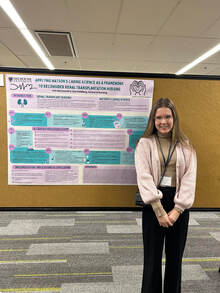 This month, STIC lab members Allyson Gallant (PhD in Health Student), Chloe Flynn (Masters in Nursing Student), Erin McConnell (PhD in Nursing Student), and Emily Devereaux (PhD in Health Student), presented at the Crossroads Interdisciplinary Health Research Conference. Crossroads is hosted by the Graduate Student Society at Dalhousie University’s School of Health and Human Performance. It has grown to a nationwide peer reviewed academic conference with submissions from diverse health-related fields. The conference provides a forum for interdisciplinary learning and collaboration between students and experts in health-related disciplines. STIC lab members provided an excellent example of this with their diverse presentations. Allyson Gallant presented her doctoral work on “Stakeholders’ experiences with school-based immunization programs during the COVID-19 pandemic”. Chloe Flynn presented her MScN thesis work on “Family involvement in the care of a patient with chronic illness during an acute care admission in tertiary care settings”. Erin McConnell’s presentation applied Watson’s Caring Science to the renal transplantation setting to explore how it can be helpful in caring for both patients and nurses. While this presentation is not directly related to Erin’s doctoral work focusing on implementation interventions and strategies in renal transplantation care, her presentation at Crossroads is from a collaboration on a manuscript for publication on this topic. Emily Devereaux presented “Identifying factors that contribute to the identification of medical complexity in a pediatric population”, in which she assessed factors that may contribute to medical complexity in a pediatric population at IWK Health. Erin stated - “It’s always great to have an opportunity to get feedback on our work and to see all the fantastic research that's going on across health disciplines. Crossroads offers an incredible opportunity for students to network and learn in an inclusive environment”. Great job to our presenters!
 Quality patient-caregiver-provider communication can be challenging in a busy, high-stress environment like the emergency department (ED). When patients and caregivers leave the ED without fully understanding what happened during their visit or the information that was given to them, it can impact their ability to manage care at home and creates potential for return ED visits. That's why Dr. Janet Curran and Dr. Christine Cassidy are co-leading a national team to develop the Emergency Department Patient-Activated Transition from Care to Home (ED-PATCH) tool, which aims to help with these challenges. Co-designed with patients, caregivers and ED healthcare providers, ED-PATCH is a discharge communication tool that is activated and managed by patients or their caregivers to record important information shared during the ED visit. Patients receive ED-PATCH in the waiting room or immediately upon placement in an assessment room and use it to track important information throughout their visit. Information such as diagnosis given, details about treatments, tests, and procedures received, medications, and treatment plans. Before leaving, the patient or caregiver shares the summary of their notes with an ED healthcare provider who confirms or clarifies information captured. The summary is then available to be printed in the ED or emailed to the patient or caregiver for their own records. The ED-PATCH team has been awarded funding from the Canadian Institutes of Health Research (CIHR) to run a trial of the tool over the next five years. The goal is to evaluate the effectiveness of ED-PATCH using an interrupted time series and to better understand the context for implementation of ED-PATCH in Canadian emergency practice settings. We will use a concurrent embedded mixed methods hybrid type 1 design with an integrated knowledge translation approach where we will work with patient and public partners, healthcare providers, and health system administrators. Want to learn more about the ED-PATCH project? Contact the Program Manager, Leah Boulos [email protected] for more information.
What are Comprehensive Examinations? Comprehensive Examinations, or better known as “comps”, can be a daunting and intimidating period in PhD programs. Differing slightly from program to program, comprehensive examinations include an intensive writing period, followed by an oral examination where you, the writer, defend your decision-making pathway highlighted in your written exams. For example: The School of Nursing boasts a 4-week intensive writing period where PhD students prepare two, 20-page responses to two questions presented by their committee. Within three weeks of the written submission, feedback is received, and an oral presentation occurs.
I hope these tips are helpful. The process can be isolating but it can also be incredibly empowering. Please never hesitate to reach out if you want to chat more on the process and to those writing in the future, you got this ☺
I'm Rebekah Bercovici, and I am currently working as a research administrative assistant in the Strengthening Transitions in Care (STIC) Lab at IWK Health.
I recently graduated from St. Francis Xavier University, with a Bachelor of Arts and Science in Health. Initially, my pursuit of a health-oriented career seemed strictly biomedical in nature. However, over the course of my four-year studies, I came to understand that healthcare delivery encompasses much more. It requires consideration of the multifaceted non-medical factors collectively referred to as the social determinants of health. My journey at the STIC Lab began as a Quality and Patient Safety Research Chair Summer student in 2023. It was during this studentship that I gained a firsthand appreciation of the often-overlooked underpinnings of healthcare delivery and health system improvement. In these past few months, my primary focus has been a scoping review on interventions used to evaluate safety culture in the operating room. Safety culture, a seemingly simple concept, has proven to be intricate and pivotal in caring for patients. My involvement in this quality improvement and patient safety project has broadened my perspective on healthcare research, and highlighted the profound impact research has on enhancing the safety and quality of care. Much like the interdisciplinary nature of my undergraduate degree, the collaboration within the lab involves an integration of individuals with diverse academic backgrounds, experiences, and expertise. It vividly exemplifies how bringing together various disciplines within a healthcare team fosters a dynamic exchange of knowledge, leading to improvements in patient outcomes, healthcare innovations, and delivery. As I reflect on my summer studentship in the STIC Lab, I am struck by the invaluable learning experience it has provided. Throughout this period, I gained essential research skills, such as article screening and data extraction, while also learning essential work skills including scheduling meetings, meeting notes/updates, sending motivational emails, and fostering effective collaboration. Undoubtedly, there were moments when I felt like I was stepping outside my comfort zone. Many concepts and tasks were unfamiliar to me and even presenting my work to the team during our monthly lab meeting was intimidating. However, it's in such moments that the unwavering support and guidance from everyone in the lab shone the brightest. Their encouragement and assistance not only helped me grow but also boosted my confidence in my abilities. Working on this review has not only expanded my knowledge but has also introduced me to an array of incredibly talented individuals. I am immensely honored to have been a summer student in the STIC lab. I want to extend my heartfelt gratitude to Dr. Janet Curran, who has been my guiding mentor throughout this journey. Observing her unwavering passion and dedication to her work has been truly inspiring, and I'm grateful for the opportunity to learn from her. I am so excited to continue my research journey this coming year and collaborate with such a talented and dedicated group of individuals!  Hi everyone! My name is Erin McConnell, and I am a registered nurse and research coordinator at Nova Scotia Health and an incoming doctoral student in the Faculty of Health at Dalhousie University. I am excited to be starting my PhD in Nursing in September 2023 under the co-supervision of Drs. Christine Cassidy and Audrey Steenbeek. My involvement with the Strengthening Transitions In Care (STIC) Lab began in the Fall of 2022 when I started my Master of Science in Nursing, and since then, I have been involved with multiple systematic reviews. My research will focus on transitions in care for kidney patients. I am also interested in knowledge translation (KT) and implementation science, which I will be discussing in this blog. This past June, I had the opportunity to go to the KT Canada Summer Institute (KTSI) held at the University of Ottawa. The KTSI is led by Canadian experts in knowledge translation and offers the opportunity for KT novices to learn how KT can address gaps in healthcare. Due to the pandemic, this was the first in-person KTSI since 2019. The institute commenced with a group smudging by Michele Whiteduck, Algonquin Knowledge Keeper. The opening ceremony was followed by an excellent overview of KT and implementation science by Dr. Melissa Brouwers which set the stage for the following three days. The KTSI comprised several informative and engaging presentations and panels by experts in implementation science, group work, and oral and poster presentations by trainees. As a novice to KT, I was delighted to learn and network with trainees and early career researchers interested in bridging the research-to-practice gap from across Canada. Attendees were from many different research backgrounds which all led them to KT – from nursing and physiotherapy to psychology and epidemiology. Multiple sessions throughout KTSI were devoted to small group work, where each group worked through an implementation plan applying the concepts learned throughout KTSI. I enjoyed being a part of interdisciplinary collaboration throughout the implementation plan development. I found one of the most helpful sessions to be the 30-second project presentations to the entire group, as it gave me the opportunity to think about how I would succinctly and clearly describe my proposed research; it also gave KTSI participants an idea of the diversity of trainee projects across disciplines. There were several takeaways that I will bring forward to my research, including knowledge user engagement, identifying the appropriate theory, model or framework for the research, and how mixed methods research can be used in KT. I am grateful for this experience and look forward to continuing my learning at future KT Canada events.
My main focus at the STIC Lab has been a systematic review on interventions for safe medication administration by nurses in acute care settings. The project is part of a broader quality and patient safety initiative, which aims to enhance the safety and quality of care provided to patients. Being involved in this project has been an incredible honour, as I truly believe it has the potential to improve patient outcomes and raise the standard of care.
One aspect that has truly blown me away during my time here is the power of interdisciplinary collaboration. The STIC Lab is a melting pot of diverse expertise, ranging from nursing to health administration, computer science, information management, and more. It’s amazing to see how this interdisciplinary approach has broadened my perspective and allowed me to appreciate the unique expertise each team member brings. Witnessing the collective brilliance at work when we bounce ideas off one another is truly incredible. Collaborating with such a talented and dedicated group has been invaluable in shaping my understanding of the complexities involved in driving positive change in healthcare. Perhaps the most influential aspect of my time here has been the mentorship of Dr. Janet Curran. As an early-career researcher myself, her guidance has been nothing short of spectacular! Her expertise, passion, and unwavering support have guided me in developing the skills necessary to conduct rigorous research and contribute meaningfully to the field of patient safety. Truly, having someone so experienced and compassionate as a mentor is a blessing, and I’m incredibly grateful for her guidance. This research experience has had a profound impact on me as a trainee. Not only has it deepened my appreciation for patient safety, but it has also highlighted the importance of well-designed care processes. Even though my background is in Psychology, the STIC Lab has provided me with a unique opportunity to bridge the gap and delve into critical health research. The lab’s commitment to patient safety has inspired me to become an advocate for delivering the best possible care while continuously seeking opportunities for improvement. The STIC Lab is not just a place of research; it’s a place of growth and support. The interactions and learning opportunities here are abundant. For example, our monthly meetings are filled with discussions on intriguing articles and research findings. During these sessions, I’ve learned about the importance of incorporating sex- and gender-based approaches into research and how implementation science can facilitate the transition of scientific findings into practical applications. Funnily enough, when I first stepped into the STIC Lab I remember feeling a bit like a fish out of water. Here I was, a Psychology student diving headfirst into research on nursing and health sciences. There were moments when I found myself uttering phrases like, “Wait, what are intravenous fluids?” or “What’s the difference between a movie theatre and an operating theatre?” But rest assured, these moments of uncertainty were met with laughter, encouragement, and the gentle guidance of the STIC Lab team. If I can pass on one piece of advice: every researcher starts somewhere, and it’s okay to feel a bit lost in this world of research. The key is to embrace the journey, learn from the best, and share a few laughs along the way! As I prepare to present my summer studentship project in August, I am filled with a profound sense of happiness and excitement. Thanks to the IWK Summer Studentship award, I’ve come to realize the potential I have to effect positive change in the health system. The experience at the STIC Lab has ignited a passion within me to continue pursuing research that aims to improve the safety and quality of care for all patients. I’m excited to continue learning from the wonderful individuals at the STIC Lab and contribute to more projects, even beyond the summer! I'm Allyson Gallant, and I'm in my third year as a doctoral student in the PhD in Health program at Dalhousie University, under the co-supervision of Dr. Janet Curran and Dr. Audrey Steenbeek. I began working in the STIC lab in 2015 as a research coordinator and have been involved in a range of projects in various roles since then. My PhD research aims to identify and address the impacts of the COVID-19 pandemic on school-based immunization programs across the Maritimes.
In April 2023, I had the opportunity to present the preliminary findings from the first phase of my PhD work at the Canadian Immunization Conference (CIC) in Ottawa. This first phase involved conducting an environmental scan of school-based immunization programs in Nova Scotia, New Brunswick, and Prince Edward Island since 2018. The scan allowed us to describe how programs were delivered prior to the pandemic, changes in service delivery during school closures from 2019 to 2021, catch-up programming for students, and whether programs have undergone any updates during the 2022-2023 school year. Another project I worked on with Audrey as a research assistant was also presented at the CIC, which examined how Nova Scotia responded to COVID-19 public health measures and vaccine uptake. You can learn more about that project here. The CIC is regularly attended by trainees, researchers, healthcare providers, and policymakers from across the country. Attending and presenting at the conference provided a great opportunity to directly communicate my research to a wide range of audiences and to help develop my research and presentation skills. Starting my PhD in September 2020 really limited the opportunities to meet people in person, so attending the CIC was an exciting chance to interact with other trainees and researchers and learn about the innovative work being done to advance vaccine research in Canada. Stay tuned for more updates on my PhD research in the next few months! Hi! My name is Amanda Higgins, and I am a research assistant with the STIC Lab. At the beginning of this November, Dr. Christine Cassidy, Implementation Scientist and Assistant Professor in the School of Nursing at Dalhousie University and Jackie Pidduck, Transition Coordinator Children's Health Program at IWK Health and I presented at the Yukon SPOR SUPPORT Unit (SSU) Summit held in Whitehorse, Yukon.
The research project that we presented was the Transition in Care study, Exploring the Transition from Pediatric to Adult Care – A Qualitative Study. You can learn more this project about here: https://mssu.ca/research/research-projects/transitions-in-care/ When the team at Yukon SSU reached out to us to present our project at their upcoming summit, we were delighted. When I was told I had the opportunity to deliver it in person in Whitehorse, I was so excited! I spent the next couple of months preparing to go North, buying snow pants, getting my winter gear out in October, and making sure my winter boots fit. I spent a couple of days exploring Yukon. From the beginning I was in awe of the mountains. I took a walk around the Yukon River and tried to embrace the cold as best I could. The next night was my favourite, as I had booked a tour to see the northern lights and it did not disappoint. After a couple of hours in the cabins, the sky lit up in shades of brilliant greens. The next day I spent time in a wildlife reserve which gave me an opportunity to see species that I may never have another opportunity to see, including a moose! Then I spent two amazing days with a great group of researchers at the Summit. Our presentation went very well. I presented with Christine and Jackie who were in Halifax and presented via Zoom. This was different, but it was amazing how technology allowed us to all be a part of the Summit! My perspective on Indigenous health has broadened, through learnings from the Summit, and has made me bring a new lens to health equity in all my current work being done in Nova Scotia. I learned how to ensure that research and health teams incorporate Indigenous leadership and guidance in an authentic and meaningful way to improve care and health outcomes. It was an amazing experience that I am so grateful to have had! |
Archives
June 2024
Categories |

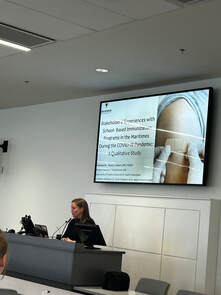
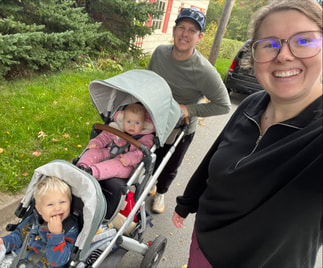


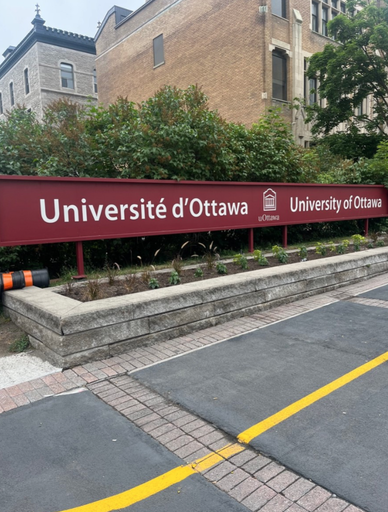

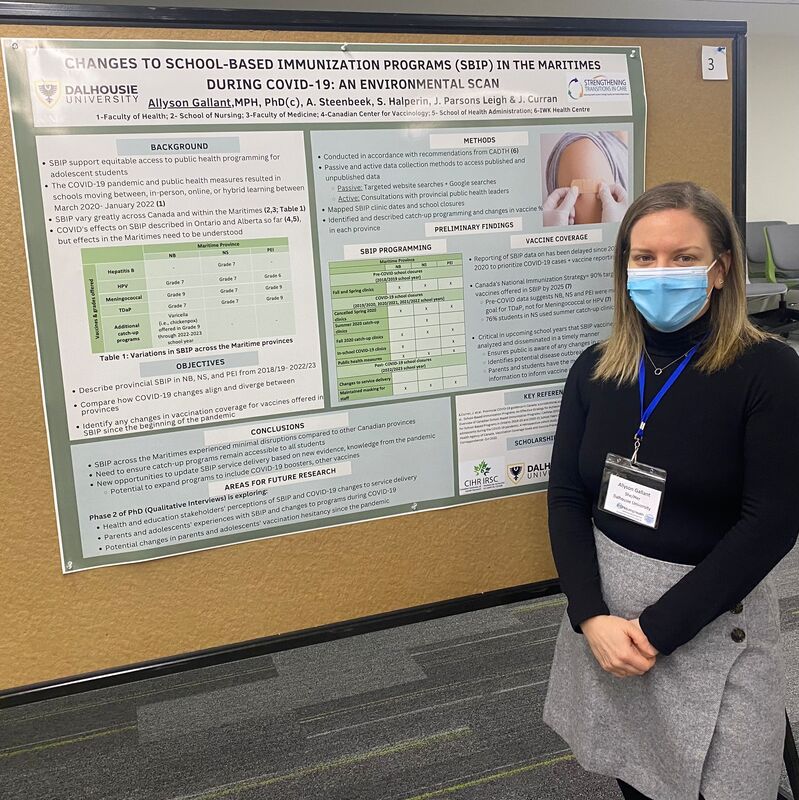
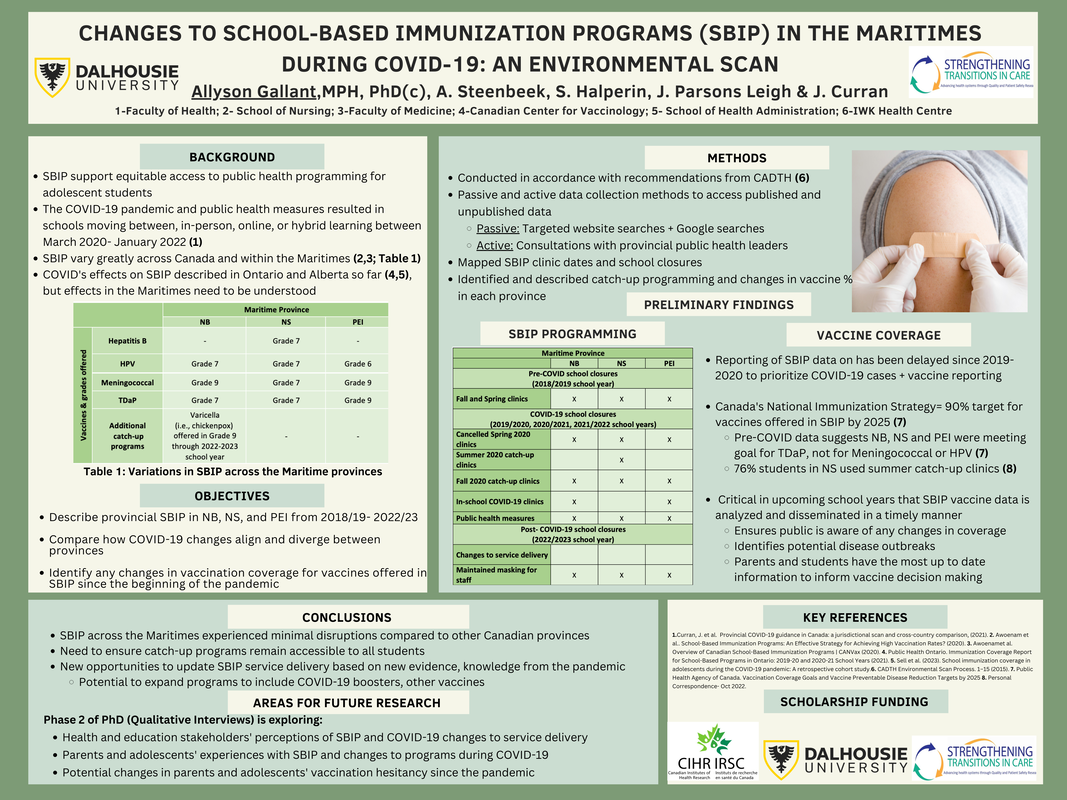



 RSS Feed
RSS Feed